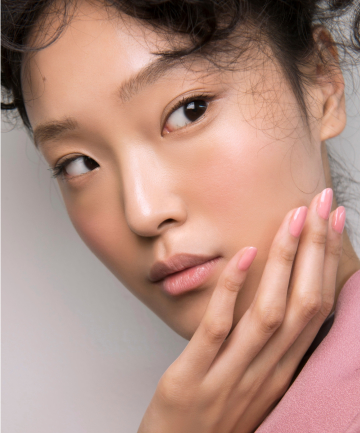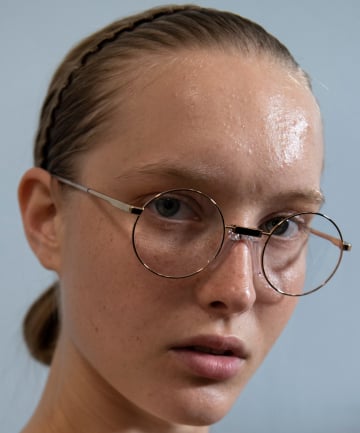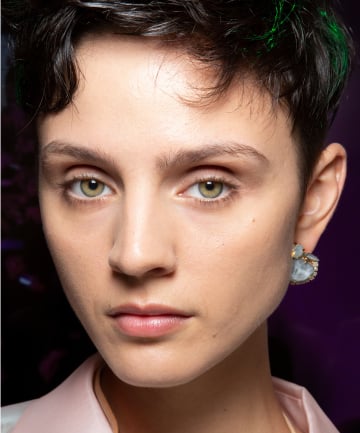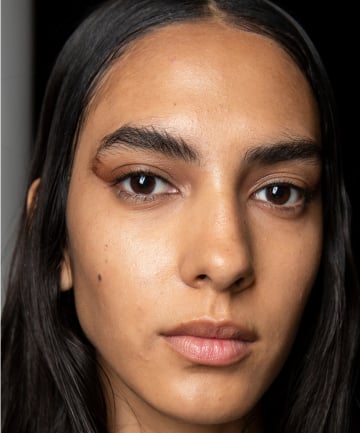There are a lot of powerful skin care ingredients that can transform skin — and retinol might just be one of the most notoriously potent. It's got a real reputation for being strong — sometimes too strong; whether you have sensitive skin or not. Suffice it to say, there's a reason why new users are meant to build up their tolerance. Additionally, there are ingredients that should never be mixed with retinol, which is why many people opt for retinol alternatives.
That said, those who still want the real deal can try different innovative formulations of retinol — including the buzzy new encapsulated retinol. Does it really help measure some of the stuff's side effects? We spoke to experts to find out.
Image via Imaxtree
That said, those who still want the real deal can try different innovative formulations of retinol — including the buzzy new encapsulated retinol. Does it really help measure some of the stuff's side effects? We spoke to experts to find out.
Image via Imaxtree
There are a lot of scientific terms in relation to retinol, so sometimes a product could contain about retinol without us realizing it. CEO and Founder of REA Innovations and Co-Founder of Clarisonic Robb Akridge, PhD says that there's a vitamin A family of nutritional organic compounds with similar chemical structures. (Warning: The group features many R-words.)
Retinol is the form of vitamin A that circulates in the bloodstream and is delivered to skin. Dr. Janet Prystowsky, NYC leading board certified dermatologist, says that vitamin A from our diets is stored in the liver primarily as retinyl palmitate. It is turned into retinol when skin (as well as eyes and tissues) needs vitamin A. In the skin, it becomes retinoic acid which results in cell growth and maturation.
Retinol that is applied topically is absorbed directly into skin cells and turns into retinoic acid, skipping the whole diet-to-liver-to-skin route.
"Retinoids" is a more general term referring to any chemical compound that functions like vitamin A. (Remember what we said about all the R's?) Akridge says that "retinoids" is often used to describe both prescription formulas with a high concentration of active retinoic acid (tretinoin), as well as over-the-counter retinols that have lower concentrations of active retinoic acid.
Image via Imaxtree
Retinol is the form of vitamin A that circulates in the bloodstream and is delivered to skin. Dr. Janet Prystowsky, NYC leading board certified dermatologist, says that vitamin A from our diets is stored in the liver primarily as retinyl palmitate. It is turned into retinol when skin (as well as eyes and tissues) needs vitamin A. In the skin, it becomes retinoic acid which results in cell growth and maturation.
Retinol that is applied topically is absorbed directly into skin cells and turns into retinoic acid, skipping the whole diet-to-liver-to-skin route.
"Retinoids" is a more general term referring to any chemical compound that functions like vitamin A. (Remember what we said about all the R's?) Akridge says that "retinoids" is often used to describe both prescription formulas with a high concentration of active retinoic acid (tretinoin), as well as over-the-counter retinols that have lower concentrations of active retinoic acid.
Image via Imaxtree
We might not know all the science, but the majority of us are familiar with retinol's anti-aging properties. It also treats acne. Akridge says that retinol's exact mechanisms aren't known but it is thought to work by increasing the rate that skin cells divide. High cell turnover can equal less pimples forming and more youthful skin. Associate Clinical Professor of Dermatology at Yale School of Medicine Mona Gohara MD says that retinoids can increase collagen production, decrease collagen breakdown, create cell turnover, prevent and treat acne, minimize wrinkles and more. Co-founder and co-CEO of Glow Recipe Christine Chang adds that the stimulation of cell turnover can fade hyperpigmentation and tackle uneven complexions.
Image via Imaxtree
Image via Imaxtree
Retinol wins for being potent and helping to slow down the march of time on skin, but it comes with side effects. Topical retinol can lead to redness, peeling, skin tenderness and sensitivity to the sun, according to Akridge. Glow Recipe co-founder and co-CEO Sarah Lee continues that in traditional formulas the potent ingredient is released all at once which can lead to irritation.
Another big issue is that like vitamin C retinol is light- and oxygen-sensitive, so it degrades readily, according to Prystowsky. If it's packaged in any old container that allows air and light to get in, the problem becomes worse... which is where encapsulation comes in.
Image via Imaxtree
Another big issue is that like vitamin C retinol is light- and oxygen-sensitive, so it degrades readily, according to Prystowsky. If it's packaged in any old container that allows air and light to get in, the problem becomes worse... which is where encapsulation comes in.
Image via Imaxtree
Encapsulating retinol cuts down exposure to air and light. As its name suggests, encapsulated retinol is delivered to skin in a "protected" capacity so it remains stable and potent for longer — we're talking on a microscopic level. The retinol is not in mini capsules that we rip open. Gohara says to think of a little submarine carrying retinol as its passenger to the parts of the skin where the active ingredient will be most effective.
Encapsulated retinol formulas slowly time release the active ingredient into skin instead of all at once on the skin's surface, like other retinol products. The benefit of encapsulated retinol is it is gentle but still potent. To continue with the metaphors, encapsulation offers a steady stream as opposed to a tidal wave of retinol.
Image via Imaxtree
Encapsulated retinol formulas slowly time release the active ingredient into skin instead of all at once on the skin's surface, like other retinol products. The benefit of encapsulated retinol is it is gentle but still potent. To continue with the metaphors, encapsulation offers a steady stream as opposed to a tidal wave of retinol.
Image via Imaxtree









